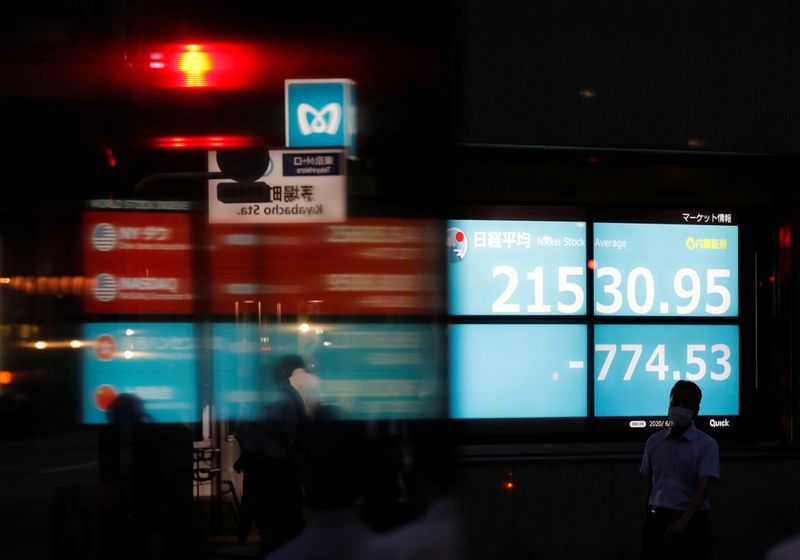By Hideyuki Sano and Katanga Johnson
TOKYO/WASHINGTON (Reuters) - Asian stocks and Wall Street futures fell on Thursday as spiking coronavirus cases in some U.S. states and in China dented hopes of a quick global economic comeback from the pandemic.
S&P 500 mini futures
Japan's Nikkei (N225) lost 1.3% while mainland China bucked the trend, with blue-chip CSI300 shares (CSI300) posting gains of 0.6%.
On Wall Street, the S&P 500 (SPX) lost 0.36% on Wednesday but tech-heavy Nasdaq (IXIC) added 0.15% due to hopes of increased demand for various online services due to the epidemic.
The daily count of infections hit a new high in California and Texas, the two most populous states in the country, while Florida, the third largest, also recorded its second-highest daily increase.
Several other U.S. states including Oklahoma, where President Donald Trump plans a campaign rally on Saturday, reported a surge in new infections.
In China, Beijing cancelled scores of flights, shut schools and blocked off some neighbourhoods as it ramped up efforts to contain a coronavirus outbreak that has fanned fears of wider contagion.
"It is a big shock to markets that China, which appears to have successfully quashed the disease, is seeing a second wave. And in the U.S. we see record cases in many states," said Norihiro Fujito, chief investment strategist at Mitsubishi UFJ (NYSE:MUFG) Morgan Stanley (NYSE:MS) Securities.
"All this suggests that the more you re-start the economy, the more infections you have. People have thought the economy will quickly recover in July-September after dismal April-June. But that is now becoming uncertain."
Graphic: Second wave in the United States, https://fingfx.thomsonreuters.com/gfx/mkt/qzjpqjxjrvx/20618C.png
Some investors also worried about further paralysis in Washington as Trump's former national security adviser John Bolton accused him of sweeping misdeeds that included explicitly seeking Chinese President Xi Jinping's help to win re-election.
Border tensions between North and South Korea, and between India and China, also helped sour sentiment for risky assets.
Investors rushed to the safety of bonds, with the 10-year U.S. Treasuries yield (US10YT=RR) falling 2 basis points to 0.710%.
"In the near-term, we have had a lot of risk-off factors including Bolton and geopolitical tensions in Asia," said Masahiko Loo, portfolio manager at AllianceBernstein (NYSE:AB) in Tokyo.
"But on the other hand, risk assets are supported by ample liquidity from central banks. I don't see that changing yet and do not expect major sell-off in risk assets."
In the currency market, the safe-haven yen rose about 0.2% to 106.81 per dollar
The euro was on back foot at $1.1250 (EUR=) ahead of a video conference between EU leaders on Friday, where they are expected to discuss a proposed 750 billion euro aid package to help countries deal with fallout from the coronavirus crisis.
The Australian dollar
Australia's unemployment rate jumped to the highest in about two decades in May as nearly a quarter of a million people lost their jobs due to the coronavirus pandemic-driven shutdowns.

Oil prices also dropped with U.S. crude futures